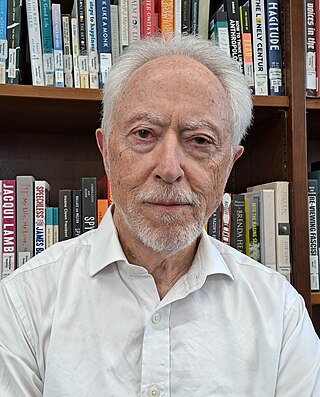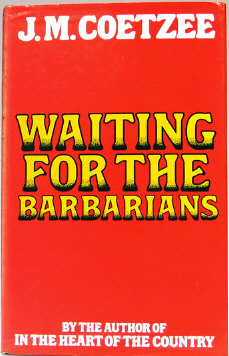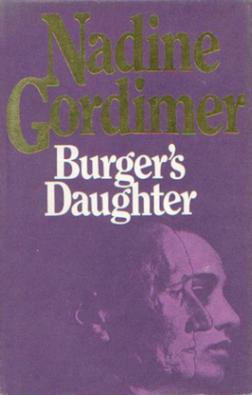Related Research Articles

John Maxwell Coetzee FRSL OMG is a South African and Australian novelist, essayist, linguist, translator and recipient of the 2003 Nobel Prize in Literature. He is one of the most critically acclaimed and decorated authors in the English language. He has won the Booker Prize (twice), the CNA Literary Award (thrice), the Jerusalem Prize, the Prix Femina étranger, and The Irish Times International Fiction Prize, and holds a number of other awards and honorary doctorates.

Abraham Louis Fischer was a South African Communist lawyer of Afrikaner descent with partial Anglo-African ancestry from his paternal grandmother, notable for anti-apartheid activism and for the legal defence of anti-apartheid figures, including Nelson Mandela, at the Rivonia Trial. Following the trial, he was himself put on trial accused of furthering communism. He was sentenced to life imprisonment and diagnosed with cancer while in prison. The South African Prisons Act was extended to include his brother's house in Bloemfontein where he died two months later.
"Adam" was the name police gave to an unidentified male child whose torso was discovered in the River Thames in London, United Kingdom, on 21 September 2001. Investigators believe the child was likely from southwestern Nigeria, and that several days before his murder, he was trafficked to the United Kingdom for a muti ritual sacrifice. To date, nobody has been charged with Adam's murder, and his true identity remains unknown.
Lucas Valeriu Ntuba Radebe OIS is a South African former professional footballer who played as a centre back.

Antjie Krog is a South African writer and academic, best known for her Afrikaans poetry, her reporting on the Truth and Reconciliation Commission, and her 1998 book Country of My Skull. In 2004, she joined the Arts faculty of the University of the Western Cape as Extraordinary Professor.

Long Walk to Freedom is an autobiography by South Africa's first democratically elected President Nelson Mandela, and it was first published in 1994 by Little Brown & Co. The book profiles his early life, coming of age, education and 27 years spent in prison. Under the apartheid government, Mandela was regarded as a terrorist and jailed on Robben Island for his role as a leader of the then-outlawed African National Congress (ANC) and its armed wing the Umkhonto We Sizwe. He later achieved international recognition for his leadership as president in rebuilding the country's once segregationist society. The last chapters of the book describe his political ascension and his belief that the struggle still continued against apartheid in South Africa.

Waiting for the Barbarians is a novel by the South African writer J. M. Coetzee. First published in 1980, it was chosen by Penguin for its series Great Books of the 20th Century and won both the James Tait Black Memorial Prize and Geoffrey Faber Memorial Prize for fiction. American composer Philip Glass has also written an opera of the same name based on the book which premiered in September 2005 at Theater Erfurt, Germany.

Dusklands (1974) is the debut novel by J. M. Coetzee, winner of the 2003 Nobel Prize in Literature. The novel consists of two separate stories, "The Vietnam Project" and "The Narrative of Jacobus Coetzee."
Pauline Janet Smith was a South African novelist, short story writer, memoirist and playwright.
Sheila Meiring Fugard is a writer of short stories and plays and the ex-wife of South African playwright Athol Fugard.

In the Heart of the Country (1977) is an early novel by South African-born writer J. M. Coetzee. The book is one of Coetzee's more experimental novels and is narrated through 266 numbered paragraphs rather than chapters.

Burger's Daughter is a political and historical novel by the South African Nobel Prize in Literature-winner Nadine Gordimer, first published in the United Kingdom in June 1979 by Jonathan Cape. The book was expected to be banned in South Africa, and a month after publication in London the import and sale of the book in South Africa was prohibited by the Publications Control Board. Three months later, the Publications Appeal Board overturned the banning and the restrictions were lifted.

David Kramer is a South African singer, songwriter, playwright and director, notable for his musicals about the Coloured communities in the Cape, and for his early opposition to apartheid.
Marguerite Poland is a South African writer and author of eleven children's books.

There is a wide range of ways in which people have represented apartheid in popular culture. During (1948–1994) and following the apartheid era in South Africa, apartheid has been referenced in many books, films, and other forms of art and literature.

Elleke Boehmer, FRSL, FRHistS is Professor of World Literature in English at the University of Oxford, and a Professorial Governing Body Fellow at Wolfson College. She is an acclaimed novelist and a founding figure in the field of Postcolonial Studies, internationally recognised for her research in colonial and postcolonial literature, history and theory. Her main areas of interest include the literature of empire and resistance to empire; sub-Saharan African and South Asian literatures; modernism; migration and diaspora; feminism, masculinity, and identity; nationalism; terrorism; J. M. Coetzee, Katherine Mansfield, and Nelson Mandela; and life writing.
Ceridwen Dovey is a South African and Australian author and social anthropologist. The winner of several awards, she is known for her first novel, Blood Kin (2007), and her 2014 short story collection, Only the Animals. In 2024 she published another collection of short stories, called Only the Astronauts.
The Childhood of Jesus is a 2013 novel by South African-born Australian Nobel laureate J. M. Coetzee.

Morris Isaacson High School is a government secondary school in Soweto. Founded in 1956, the school took an important role at the start of the Soweto Uprising in 1976.
References
- ↑ Tepper, Anderson (9 August 2005). "Books". The Village Voice . Retrieved 25 September 2015.
- ↑ Nixon, Rob (20 November 2005). "Feeling Lost and Found". The New York Times . Retrieved 26 May 2008.
- ↑ "Blood Orange - from page to stage". Official website of the City of Johannesburg. Retrieved 5 September 2014.